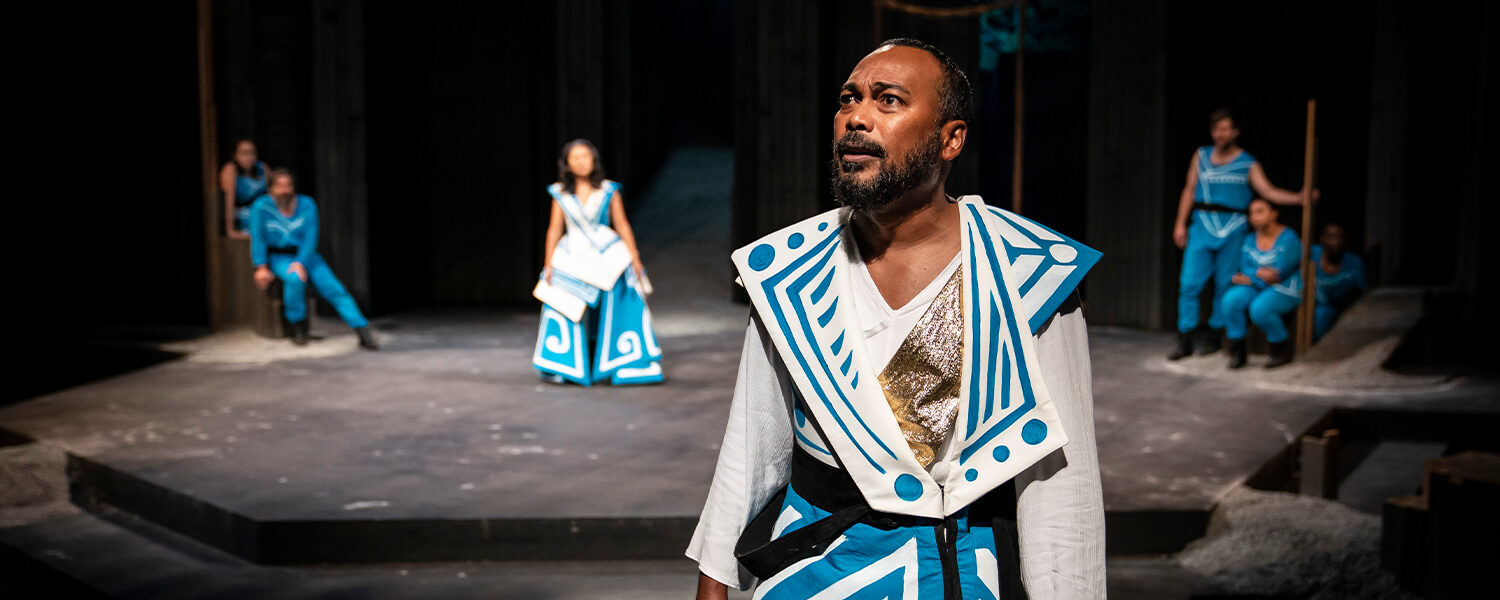Contact Us
American Players Theatre
5950 Golf Course Road
P.O. Box 819
Spring Green, WI 53588
(Map)
Box Office: 608-588-2361
Administration: 608-588-7401
Fax: 608-588-7085
American Players Theatre
5950 Golf Course Road
P.O. Box 819
Spring Green, WI 53588
(Map)
Box Office: 608-588-2361
Administration: 608-588-7401
Fax: 608-588-7085

APT’s ‘Oedipus’ is relatable and relevant
By Gwendolyn Rice, Isthmus | September 23, 2021
As the long-term substitute teacher for a high school English class a few years ago, I taught the ancient Greek classic Oedipus to a room full of bored, cynical 17-year-olds. And while I got them through the other assigned texts that semester, I struggled to find a way to make the Sophocles tragedy exciting (or even interesting) for the students. I told them about the festival of Dionysus, the ornate, exaggerated masks, and the groundbreaking actor Thespis. I showed them pictures of huge amphitheatres chiseled into hills that have survived for thousands of years, and tried to wade through the text page by page, decoding the poetry of the chorus. Desperate to make the enormous tragedy relevant, I told them we study it because it was one of the first plays presented in Western history. It was the beginning of an art form that is the most vibrant, necessary, challenging, revelatory means of communication ever to be invented.
They yawned while copying and pasting the answers to my study questions from SparkNotes. They bombed the test.
So it was with the skepticism of a high school junior that I climbed the hill at American Players Theatre on Sept. 19 for the opening night performance of Oedipus, adapted and directed by David Daniel. One of the most gifted members of APT’s Core Company and the organization’s education director, Daniel, I decided, had his work cut out for him. But over the next 100 minutes, the production seemingly reinvented the classic Greek text, illuminating the language, deftly inhabiting the themes, and transforming the archaic story of gods and oracles, prophecies and betrayals, into a vibrant and passionate tragedy, pulsing with both intensity and relevance.
Much of the credit for this extraordinary feat goes to Daniel’s agile adaptation, which is fast moving, easily accessible, and stripped down to the essentials. Like a sly storyteller who wants to make sure everyone is listening, Daniel also slips in some very modern lines and phrases in the midst of scenes that are much closer to the source material, waking up the ear and nimbly connecting the ancient characters to modern audiences.
As Daniels has shaped the play to make the main characters more human, recognizable and relatable, he has also remade the chorus, transforming it from a wailing group of narrators commenting on the action in unison to a body of individual characters with opinions of their own. As the play unfurls, the chorus evolves from dancers circling the stage — reminiscent of paintings on ancient Greek vases — to the townspeople of Thebes who agree, discuss and disagree as if they are talking politics in a bar, having a chat over dinner, or posting on Twitter. It’s a spectacular evolution and again, one that speaks directly to 21st-century audiences.
The chorus still discusses many central questions in Oedipus: Do humans have free will or are they destined to play out the roles that fate has assigned them? Does Oedipus earn his tragic downfall by becoming too full of hubris? Is he punished for a fatal flaw or is he a pawn in the gods’ terrible games? But this production does not dwell on philosophical questions. It focuses on the human cost of knowing the whole truth, and that is a revelation.
In the title role, Gavin Lawrence is sublime. We meet him as an honest and just king whose greatest concern is for his subjects’ welfare. He soon learns from the oracle that to end the Thebans’ suffering, he must find the murderer of the former king and punish him. As Daniel writes in the program notes, the play begins as a simple crime procedural. Of course we know at the start that uncovering the murderer’s identity will end in torment, but watching Lawrence recoil in horror as each new truth is revealed to him — damning him — is a spellbinding journey.
This Oedipus demands the truth, even though the tellers would rather die than reveal it. He demands to face the truth even though it will strip him of every good thing in his life, as well as his sight. He demands the truth even though it erases every action he has taken to avoid harming those he loves. This relentless devotion to unearthing the lies that have surrounded him and helped him to flourish is extraordinary. Lawrence not only draws us into his struggle, he makes us feel every cut. When we would look away, he shines the light more intently. Lawrence’s final piercing cry of agony echoes through the trees surrounding the stage and cuts through the audience like the brooch pins he uses to maim himself.